中考英语语法:英语八大时态复习(100张幻灯片)
初中英语-中考时态复习-公开课精品课件-八大时态完整版

often,always,usually,sometimes, every day/week/month/year...
习惯活动 现在情况 客观事实 主将从现
I get up at six every morning. They are very busy. He needs help.
当主语不是第三人称单数时:
• 肯定句 :主语+动词原形+其它 • 否定句 :主语+don't+动词原形+其它 • 一般疑问句: Do+主语+动词原形+其它 • 特殊疑问句:特殊疑问词+一般疑问句 注意★:句式结构错则全句都错。 • 谓语动词的形式:do/does • 助动词的形式:don't(do not)/doesn't(does not)
英语时态复习
初中阶段应掌握的时态共有八种:
一般现在时、一般过去时、一般将来时 现在进行时、现在完成时 过去进行时、过去将来时、过去完成时
在英语语法中,"时"指动作发生的时间,"态"指动作的样子和状态。
一般现在时 Present Simple
What does he/she often do? What do they often do?
肯定式 I work. You work. We work. They work. He works.
疑问式
否定式
疑问否定式
Do I work?
I don't work.
Don't I work?
Do you work? You don't work. Don't you work?
2023年中考英语语法专项复习之八大时态课件

THANKS
感谢观看
构成
一般现在时由动词、主语和助动词构成:助动词包括be动词(am,is,are ),情态动词(can,may,must)和have/has。
动词的形式取决于主语的人称和数
用法
描述现在的日常情况或习惯 描述普遍情况或事实 与过去或未来的情况形成对比
例如:Last year, we visited Paris, but this year we are going to London.(去年我们去了巴黎,但今年 我们要去伦敦。)。
初中英语语法专项复习之八大时态
汇报日期
目录
01
02
03
04
05
06
07
08
一般现在时 一般过去时 一般将来时 现在进行时 过去进行时 将来进行时 现在完成时 过去完成时
1 一般现在时
定义
一般现在时表示经常发生的动作或状态:它描述的是 现在的日常情况、习惯或普遍的情况。
与过去或未来的情况形成对比
用法
现在完成时可以用于描述过去发生的动作对现在造成的 影响或持续动作。例如,“I have finished my homework”(我已经完成了我的作业),表示过去的 动作“做作业”已经完成,对现在产生了影响,即“我 现在已经完成了作业”。现在完成时也可以用于描述过 去动作的持续状态。例如,“He has lived in this city for ten years”(他已经在这个城市住了十年),表示 过去的动作“住在这个城市”已经持续了十年,现在是 第十年。
用法
一般现在时是英语语法中的一种时态,通常用于描述现在 的状态或经常发生的动作。例如,“我每天早上喝咖啡” 和“他喜欢读书”都是使用了一般现在时。
中考英语语法专题讲解——时态 (共31张PPT)

The bus is coming soon.
③ 常与现在进行时连用的时间状语和标 志词有:now, these days, look, listen等。
①表示发生在过去的或已经完成的对现在仍有 影响的动作。
I have lost my key.
①表示现在或者现阶段正在进行的动作或持续 的状态。
They are singing in the next room now.
The students are working on the farm these days. ②现在进行时表示将来的动作,这种结构的动 词有:go, come, start, begin, arrive, leave等, 表示即将发生的动作或者安排好要做的事情。
He had finished his homework before he went to bed.
②常与过去完成时连用的时间状语有:by last week, by the end of last year。
Just as I got to the school gate, I realized I had left my book in the cafe.
Will you be back in two days?
Where shall we meet tomorrow? 注意:“will+动词原形”还可以表示愿意做某 事或者客观性的将来。
We will help him if he asks us.
The sun will rise at 6:00 tomorrow morning.
③ go, come, leave, arrive, start等动词的过去进行时 表示过去按计划即将发生的动作。
初中英语八种时态归纳PPT
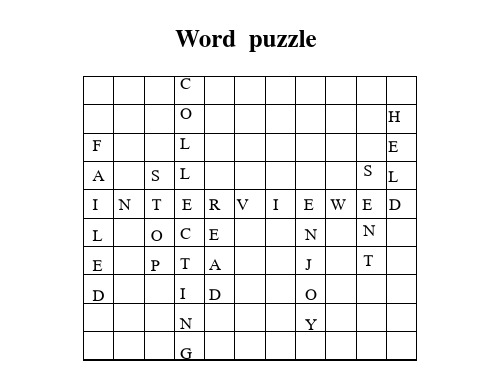
Part B 语态
Active Voice
Passive Voice
主动语态
1. Many people speak English.
At the party.
--- I _l_ik_e___ your jacket, Tim. How long _h_a_v_e_y_o_u__h_a_d__ it?
Oh…er… I __b_o_u_g_h_t__it last week. W__o_u_l_d_y_o_u__li_k_e_ to dance, Becky? ---Phew. It’s __h_o_t__ here. --- Put your jacket on the chair. You ____n_e_e_d_n’wt orry. It’ll be ok. ---That’s _b_e_tt_e_r __.
8. Mr. Green and his wife had lived (live) in London for a few years before they came (come) to work in China in 2001.
9. He said he w__o_u_ld__n_o_t_s_p_e_a(k not,speak) at the meeting the next day.
4. Hurry! Your classmates _a_r_e_w__a_it_i_n_g(wait) for you in the classroom..
1. This is the third time you _h_a_v_e__b_e_e_n__(be) here.
英语时态8种基本时态讲解ppt课件

认识到了贫困户贫困的根本原因,才 能开始 对症下 药,然 后药到 病除。 近年来 国家对 扶贫工 作高度 重视, 已经展 开了“ 精准扶 贫”项 目
4.过去将来时
• 过去将来时是立足于过去某时,从 过去的观点看将要发生的动作或状 态。主要用于宾语从句中。
认识到了贫困户贫困的根本原因,才 能开始 对症下 药,然 后药到 病除。 近年来 国家对 扶贫工 作高度 重视, 已经展 开了“ 精准扶 贫”项 目
• c)以辅音字母+y结尾的单词变y为i加 -es.
• Study---studies carry-carries • d)以元音字母+y结尾的单词直接加-s. • play---plays stay---stays
• 句型结构:主语+will/shall+V.原形 +…(第一人称用shall)
• I shall go to Shanghai tomorrow. • They will have a meeting next week. • ----She will be 20 years old.
认识到了贫困户贫困的根本原因,才 能开始 对症下 药,然 后药到 病除。 近年来 国家对 扶贫工 作高度 重视, 已经展 开了“ 精准扶 贫”项 目
认识到了贫困户贫困的根本原因,才 能开始 对症下 药,然 后药到 病除。 近年来 国家对 扶贫工 作高度 重视, 已经展 开了“ 精准扶 贫”项 目
初中8个时态 ppt
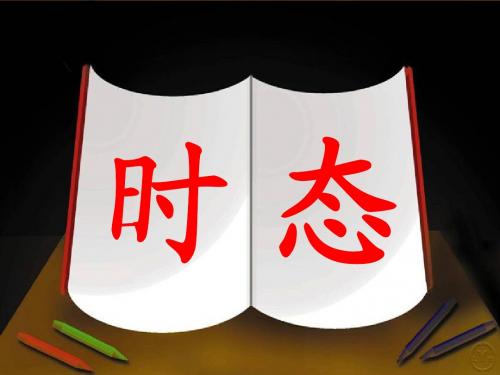
一般现在时用法 习惯活动 现在情况 客观事实 主将从现
I get up at six every morning. They are very busy. He needs help. The moon moves round the earth. We’ll go there if it doesn’t rain. He’ll call you when he arrives.
现在完成时用法
I can’t find my pen. I have lost 过影响现 it. Have you finished it yet ? He has worked here for a year. 过延到现 I have been in this school since 1999 . He has been to China twice. 两“去” He isn’t here. He has gone to the library.
①一般现在时:表示现在经常反复发生的动作、存在 的状态或习惯性的动作。动词写原形或第三人称单数 形式,即主语为第三人称单数时,动词一般要加-s/es, 与名词复数规则构成类似。如果动词为行为动词,构 成问句、否定句需加助动词/do/does;一般现在时的 时间标志词有: often,always,sometimes,usually,every day,on Sundays等;另外表示主语具有的性格、能力、特征, 表客观事实和普遍真理,表现在发生的具体动作等也 用一般现在时;在时间和条件状语从句中常用一般现 在时代替一般将来时;预先计划安排好的将来行为也 可用一般现在时;状态感觉动词如:be,love,want, hope,understand等只用一般现在时,不用进行时。
过去完成时,表示在过去某一时间或动作之 前已完成的动作或存在的状态。过去完成 时的构成为:had+done;过去完成时的时 间状语常用by加过去点时间,by the end of 加过去段时间,before加过去点时间表 示,有时用when,before,after等引导的 时间从句中。
初中英语八种时态讲解(课堂PPT)

carry→carries
fly→flies
9
1. He______(be, am, is, are) a teacher at No. 2 Middle School. 2. He______(have, has) classes in the afternoon. 3. He______(get, gets) up at half past six every morning. 4. He always _____(come, comes ) to school on time. 5. He ______(study, studies) very hard at his lesson. 6. One and two _____(be, is, are) three. 7. Blue and yellow _____(make, makes) green. 8. The earth _____(move, moves) round the sun. 9. I will go there if I ____( be, will be, am, is,
词。)⑤在时间状语从句和条件 状语从句中,主句用一般将来时 (will+动词原形),从句中用一般
现在时表将来。(主将从现)6
当主语是第三人称 时,谓语动词要用 第三人称单数形式, 加-s/es。除此之外 都用动词原形。
7
动词第三人称单数 形式变化规则
8
规则
Hale Waihona Puke 例子一般在词尾加-s,(清辅音后 Play→plays 读/s/,在浊辅音后读/z/; leave→leaves 在t后读/ts/,在d后读/dz/。) swim→swims
助动词do提问,如主语为第三人称单数,
初中英语八种时态讲解ppt课件
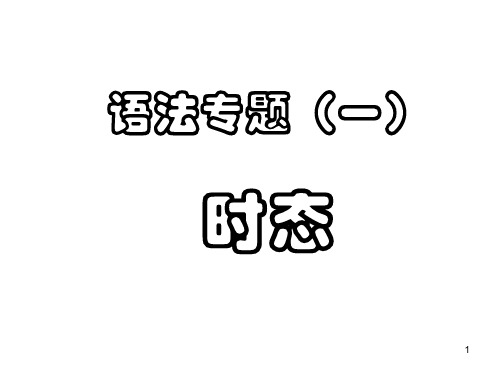
当主语是第三人称 时,谓语动词要用 第三人称单数形式, 加-s/es。除此之外 都用动词原形。
7
动词第三人称单数 形式变化规则
8
规则
例子
一般在词尾加-s,(清辅音后 Play→plays 读/s/,在浊辅音后读/z/; leave→leaves 在t后读/ts/,在d后读/dz/。) swim→swims
助动词do提问,如主语为第三人称单数,
则用does,同时,还原行为动词。
4
什么情况下用?
5
①表示经常或习惯性的动作或存 在的状态。②表示主语通常的能 力、兴趣爱好、和性格特征。③ 表示客观的事实或真理。④表示 按照时刻表或已经计划安排好的 将来行为。(只限于是go, come, leave, arrive, begin, start, take off, stop, be等表示开始或移动意义的 词。)⑤在时间状语从句和条件 状语从句中,主句用一般将来时 (will+动词原形),从句中用一般
work→worked
结尾是e的动词在末尾加-d
like→liked live→lived hope→hoped
末尾只有一个辅音字母的重读闭音 plan→planned 节,先双写这个辅音字母,再加-ed stop→stopped
drop→dropped
结尾是“辅音字母+y”的动词,先 study→studied
11
一般过去时
12
概念:过去某个时间里发生的动作或 状态;过去习惯性、经常性的动作、 行为。 时间状语:ago, yesterday, the day before yesterday, last week(year, night, month…), in 1989, just now, at the age of 5, one day, long long ago, once upon a time, etc. 基本结构:①be动词;②行为动词 否定形式:①was/were+not;②在行为 动词前加didn't,同时还原行为动词。 一般疑问句:①was或were放于句首; ②用助动词do的过去式did 提问,同时 还原行为动词。
中考语法复习八大时态
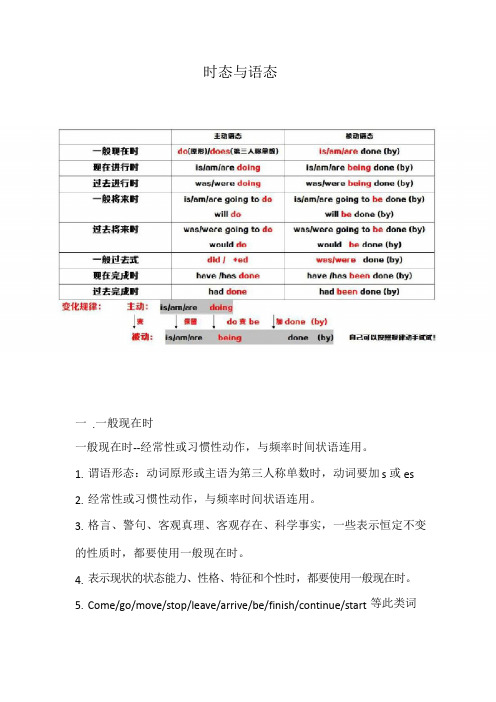
时态与语态一.一般现在时一般现在时--经常性或习惯性动作,与频率时间状语连用。
1.谓语形态:动词原形或主语为第三人称单数时,动词要加s或es2.经常性或习惯性动作,与频率时间状语连用。
3.格言、警句、客观真理、客观存在、科学事实,一些表示恒定不变的性质时,都要使用一般现在时。
4.表示现状的状态能力、性格、特征和个性时,都要使用一般现在时。
e/go/move/stop/leave/arrive/be/finish/continue/start等此类词本身表示计划,将要发生的动作等,常用一般现在时表示将来的状况6.在时间状语从句或条件状语从句中的重点考点-主将从现--用一般现在时代替一般将来时例句:1.The earth moves around the sun.2.The train comes at3o’clock.二.一般过去时一般过去式--表示在过去的时间内,动作已发生或完成。
谓语形态:动词要变为过去式。
一般是动词后+ed或不规则变化1.一般过去式表示在过去的时间内,动作已发生或完成。
2.标志词:通常,一般过去时带有表示动作发生的时间的词,词组或从句,如yesterday,the day before yesterday,last week,two days ago等,但上下文清楚时可以不带时间状语。
3.过去经常,反复发生的动作,也可用used to或would加动词原形来表达。
used to也可用于表示过去曾经存在过的状态。
I used to go fishing on Sundays.During the holiday he would go fishing.This river used to be clean.4.使用一般过去时的特殊句型如下:(1)It's time+(that)从句。
It's time we had supper.(2)sb.+wish+(that)从句。
英语八大时态PPT课件(详细版)

A
知识导航
种类
一般现在时 一般过去时 一般将来时 现在进行时 现在完成时 过去进行时 过去完成时 过去将来时
构成
do/does did will/shall+动词原形 am/is/are + doing have/has+过去分词 was/were + doing had+过去分词 would/should+动词原 形
A
4
※表示主语所具有的特征、性格、 能力、状态等
She is a middle school student. She looks a little worried. ※某些以here/there开头的句子 中,用一般现在时表正发生的动 作
Here comes the bus.
A
5
※表示将来发生的、时刻表上不改变的事 The train leaves Hunan at five o’clock. ※特殊情况 在时间状语从句和条件状语从句中,若主 句用一般将来时,则从句用一般现在代替 将来。(主将从现)
A
21
四、一般将来时
1、构成 一般将来时态由
“will/shall+动词原形”构成,me to ask Mary for help.
A
22
2、其他表示
※be going to +动词原形:表示 说话人主观的打算或预测。 I am going to look for a job here. It is going to be a fine day for camping tomorrow.
【小试牛刀】 他们昨天这个时候正在吃晚餐。
They were having dinner this time yesterday.
英语八大时态复习(100张幻灯片)
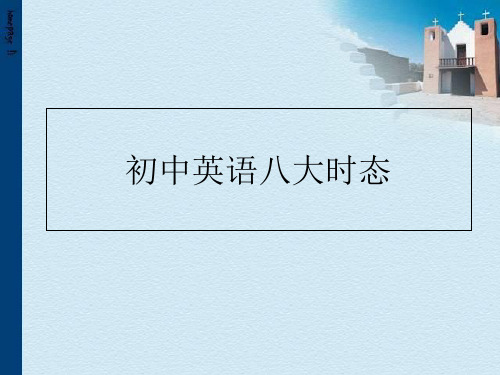
2. 当 主 语 是 单 数 第 三 人 称 时 , 它与助动词Does有关,但是 动词谓语一定要恢复为原形。 当主语是其他人称时,它与 助动词Do有关。
I like English. She likes it very much. We go to work by bike.
否定句
I don’t like English.
exercise
把下列句子改为一般疑问句
1.He has a meeting on Sundays . Does he have a meeting on Sundays ?
2.He goes to school at seven in the morning . Does he go to school at seven in the morning?
把下列句子改为否定句
1.My father has an egg for breakfast . My father doesn’t have an egg for breakfast .
2.Li Lei does his homework after school. Li Lei doesn’t do his homework after school.
3.We do our homework at home. We don’t do our homework at home .
4.They have a meeting every morning . They don’t have a meeting every morning .
用所给动词的正确形式及助动词填空
3.My father and mother go out for lunch on Sundays. Do your father and mother go out for lunch on Sundays ?
初中英语八大时态复习课件(共48张PPT)

安静!老师正在办公室里谈话。
如何判断现在进行时
考点大观 易错辨析 通关训练
(3)现在进行时常用来表示在当前一直做着的动词, 这时句中常用these days ,all the time等时间状语。 Eg:
特殊问句:特殊疑问词 +will +主语+动词原形+ 其他?
They won’t use books .
Will students go to school in the future ?
What will your dream school have ?
一般将来时的结构
考点大观 易错辨析 通关训练
考点大观易错辨析通关训练过去将来时定义在过去的时间点将要发生的事情从过去时间点看将来常用于宾语从句中考点大观易错辨析通关训练过去将来时的结构否定形式问句形式主语wouldshouldnot动动词原形一般问句
新目标九年级
时态的学习
设计教师:杨庄中学颜姣姣
讲解方法
• 各个时态均从四个方面进行讲解,包括定 义,句子结构,句子标志性词语及时 态判定。
持续进行: these days, all the time Uncle Wang is building a small room for his dog these days.
如何判断现在进行时
考点大观 易错辨析 通关训练
(1)一般句中用到表示“在现在”的时间状语,如: now, right now, at the moment 或It’s+几点钟”句 型,常判断用现在进行时。Eg:
never, seldom, every week/day/year/month.. I do my homework every day.
初升高英语句子八大基本时态复习ppt课件
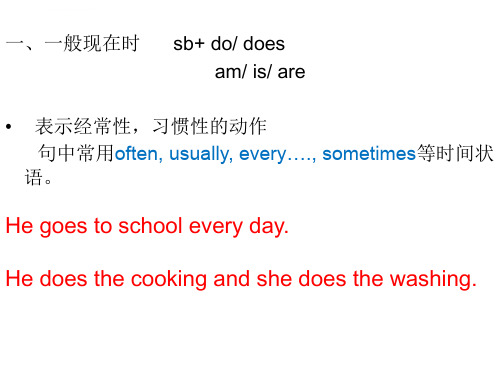
• 表示过去某时正在进行的状态或者动作。 It was raining when they let the station. 他们离开车站时,正下着雨。 2. 描述另一件事情发生的背景。一个长动作延续时,
另一个短动作发生。
My brother fell while he was riding his bicycle and hurt himself.
自我验证:
• I think she ______ (会回家)for supper. • What _______( 你打算做什么) tomorrow? • I _______( 要见你) you at the school gate
tomorrow morning. 1. Look at the clouds, there _______(一场暴风雨 要
经营者提供商品或者服务有欺诈行为 的,应 当按照 消费者 的要求 增加赔 偿其受 到的损 失,增 加赔偿 的金额 为消费 者购买 商品的 价款或 接受服 务的费 用
三、一般将来时 • 单纯的将要发生的动作或者情况,常与表示将来的时间状
语连用。 Tomorrow will be Sunday. 2. 表示临时决定要做的事情。 ——I thought I asked you to sweep the floor. ------ Oh, I am sorry. Mother, I will do it right now. 3. 有时没有时间状语, 但从意思上可以判断指将来的动作。 You will pass the examination. 4. 还可表示倾向和习惯性。 Oil will float on water.
知识来源于实践。 Knowledge begins with practice.
九年级英语中考复习专项—八种时态 (共50张PPT)

4)表示客观真理,客观存在,自然现象。
例如:The earth moves around the sun.
地球绕太阳转动。
5)表示按计划或安排好的将要发生的动作,可用 一般现在时表将来。但只限于 start,begin,leave,go,come,arrive,return等。
例如:The train leaves at six tomorrow morning.
我是个孩子的时候,常在马路上踢足球。
3)一般过去时也可与today,this week,this month,this year等表现在的时间状语连用,但这 些时间状语须指过去的时间,决不包含“现 在”“此时此刻”的意思。
例如:Did you see him today?
今天你看见他了吗?
I did my homework yesterday.
火车明天上午六点开。
6)在复合句中,当主句是一般将来时,时间状语 从句或条件状语从句的谓语动词只能用一般现在 时来表示将来。
例如: I'll tell him the news when he comes back. 他 回来时,我将告诉他这个消息。
If you take the job , they will talk with you in greater details.
2. 一般现在时的用法 :
1) 表示经常性的或习惯性的动作,常与表示频 率的副词连用。常用的频率副词有: always、 often、 usually、seldom、never。频率副词在句 中通常位于行为动词之前,系动词、助动词之 后。
例如: He often goes swimming in summer.
以字母s,x,ch,sh,o结尾 的词加-es
- 1、下载文档前请自行甄别文档内容的完整性,平台不提供额外的编辑、内容补充、找答案等附加服务。
- 2、"仅部分预览"的文档,不可在线预览部分如存在完整性等问题,可反馈申请退款(可完整预览的文档不适用该条件!)。
- 3、如文档侵犯您的权益,请联系客服反馈,我们会尽快为您处理(人工客服工作时间:9:00-18:30)。
·特殊 have-has 等
写出下列动词的第三人称单数形式
help s guess es flyies makes leaves fix es swim s know s
play s
closes
go es studyies gets read s bring s watches
Eg. 1、The evening class begins at 19:00. 2、The train starts at two.
If 条件句中,动词用一般现在时表将来。
• If we hurry, we may catch the bus.
如果我们快点的话,我们也许会赶上公交车
If it rains tomorrow, the travel will be canceled.如果明天下雨的话,旅游将取消。
把句子中的动词改为过去式形式。通常有 五种写法。
动词过去式的写法:
一般情况,
I work in this city.
在动词 city last year. 加ed
They live in Shanghai . They lived in Shanghai last year.
1. We often __p_la_y_ (play) in the playground. 2. He _g_et_s_ (get) up at six o’clock. 3. _D_o_ you b_r_u_s_h (brush) your teeth every morning? 4. What d_o_e_she usually_d_o_ (do) after school? 5. Danny_s_t_ud_i_e_s (study) English, Chinese, Maths, Science and Art at school. 6. Mike sometimes _g_o_es__(go) to the park with his sister. 7. She w_a_t_ch_e_s (watch) TV with his parents every evening. 8.D__oe_s_ Mike _r_ea_d_(read) English every day?
exercise
把下列句子改为一般疑问句
1.He has a meeting on Sundays . Does he have a meeting on Sundays ?
2.He goes to school at seven in the morning . Does he go to school at seven in the morning?
把下列句子改为否定句
1.My father has an egg for breakfast . My father doesn’t have an egg for breakfast .
2.Li Lei does his homework after school. Li Lei doesn’t do his homework after school.
注: 主语(三单)+ 动词(第三人称单数形式)+其他
Eg. 1) She likes it very much.
2) She usually goes to school at 7 o’clock every morning.
动词第三人称单数形式
·在动词后+s
· 在以s,x,ch,sh,o结尾的动词+es · 以辅音字母+y结尾的动词,
4. He is too young to go to school.
Hew__a_stoo young to go to school.
5. You are late for school. Youw_e_r_elate for school.
不含be动词的一般过去时
不含be动词的句子改写成一般过去时,
The Future Simple Tense
1.will+动词原形 (I /we shall)
结 2.be going to+动词原形 构 3.be+v-ing
4.一般现在时表将来
• 1.will/shall+v原形
表示一个将来的动作或状态,“要…,会…” Eg. 1) She will go to the park tomorrow.
I am a teacher. You are a worker. He is a student.
We are friends.
Are you a teacher?
疑 问
Are you a worker?
句 Is he a student?
Are you friends?
2.对于实意动词,疑问句要求是:当主 语是他(he),她(she),它(it)时,句子前 面加does,并把动词恢复原形;当主语 是其他人称时,句前加do ,第一人称 (I/we) 换第二人称(you)。
I often go there. You like the music. He goes to work by bus . We /You/They like it.
Do you often go there ? Do you like the music.? Does he go to work by bus ? Do you/they like it?
• 我们明天动身去青岛.
• We’re leaving for Qingdao.
6.表示与生日,日历,课时安排或交通时刻表有关的 动作(一种规律) ,用一般现在时表示将来时态
• 常用于转移动词如: ★ ( begin, come , leave, go, arrive, start, stop,
return, open, close… )
2. 当 主 语 是 单 数 第 三 人 称 时 , 它与助动词Does有关,但是 动词谓语一定要恢复为原形。 当主语是其他人称时,它与 助动词Do有关。
I like English. She likes it very much. We go to work by bike.
否定句
I don’t like English.
含有be动词的一般现在时变一般过去时, 把is和am改成was,把are改成were
练习:
1. She is a teacher. She w__as_a teacher.
2. They are from Japan. Theyw_e_r_e from Japan.
3. I am very tired. I _w_a_s very tired.
3、一般将来时 The Future Simple Tense
一般将来时
相对于讲话时间将要发生的动作或情况
2.时间状语(判断标准):
• tomorrow 明天 • next week 下周 • the day after tomorrow 后天 • soon 不久 • in the future 在将来 • in+一段时间 多久之后才...
Exercise: 1. —What are you going to do this
carryies do es wash es visit s exercise s enjoy s jump s hhaavse
一般现在时否定式
be + not don’t do / doesn’t do
II 一般现在时的否定式
1.Be 动词的否定式: be + not
I am a teacher.
I’m not a teacher
You are a worker 否定句 You aren’t a worker
She is a doctor
She isn’t a doctor.
We are friends.
We aren’t friends.
is not=isn’t
are not=aren’t
教学重、难点
2、一般过去时 The Simple Present Tense
一般过去时
➢一般过去时指动作发生在过去
➢有时候会有例如yesterday,last year等表示 过去时间的标志
➢一般过去时主要要注意动词的变化
be动词和实意动词
含有be动词的一般过去式
• She is in Beijing. • She was in Beijing . • I am a student. • I was a student. • We are friends. • We were friends.
例如:have/has—had, go---went, eat---ate, say--said think—thought, come--came
不规则动词练习
• I think you are right. • I thought you were right. • She eats an apple every week. • She ate an apple an hour ago..
She doesn’t like it very much.
We don’t go to work by bike.
III一般疑问句
概念:用 yes 或 no 来回答的疑问句叫做一般疑问句。 一般疑问句句首的第一个词一般读得比较重。
1.对于be 动词,疑问句要求把be 提前, 第一人称变成第二人称。
3.We do our homework at home. We don’t do our homework at home .
4.They have a meeting every morning . They don’t have a meeting every morning .
